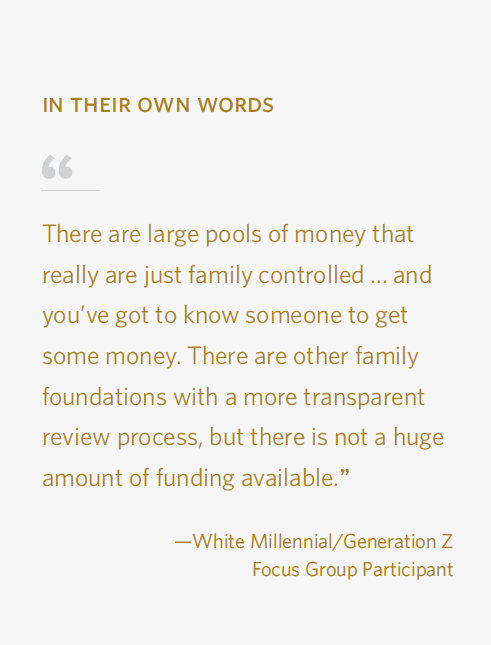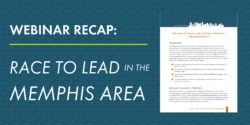Aug
27
2020
Earlier this month, the Building Movement Project (BMP) partnered with Momentum Nonprofit Partners to present the findings of a new publication, The Nonprofit Racial Leadership Gap in the Memphis Area: A Race to Lead Brief, during the Mid-South Nonprofit Conference Virtual Summit. The presentation and panel discussion was moderated by Dorian Spears (Chief Partnerships Officer, Momentum Nonprofit Partners) and featured Sean Thomas-Breitfeld (Co-Director, BMP) and Tessa Constantine (Research Analyst, BMP), who presented the data and findings from the brief. They were joined by local leaders Tosha Downey (Director of Advocacy, Memphis Education Fund) and Sam O’Bryant (Senior Director of Equity & Partnerships, SchoolSeed Foundation), who responded to the report findings and shared their thoughts and experiences on working in the nonprofit sector.
The findings of the Memphis brief are based on the data collected in our 2019 Race to Lead Survey, which received responses from over 5,000 nonprofit staff on their experiences of race and leadership in the sector. In particular, this new brief builds upon the insights of the recently released national report (Race to Lead Revisited), and offers an in depth exploration of the data collected from the subset of respondents who work in the Memphis area.
Quick access: download the report, view the presentation slides, watch the recording.
The panel was informative, insightful, and motivating, and we have included a few of the main takeaways below.
Leadership aspirations and racialized barriers to advancement
The data collected from our 2019 survey revealed that people of color express aspirations to lead at a higher rate than their white counterparts. This was the case in 2016 when we surveyed the nonprofit sector for the first time, and it remains true three years later. However, people of color who responded to the survey were more likely to report that their race had a negative impact on their career advancement. Both Tosha and Sam identified with this data point, pointing to the disproportionately high standards that employees of color are held to compared to their white colleagues. Tosha emphasized that, even with advanced degrees and myriad qualifications, staff of color feel more pressure to jump through hoops and prove their skills.
Racial composition of nonprofits and their impact on staff experiences
The 2019 survey featured new questions related to the racial demographics of organizations, as well as the experiences of staff in the workplace. This new data allowed us to see patterns between what survey respondents reported about their experiences as employees and the racial composition of their organization’s Board and senior staff. For example, we found that people working in POC-led groups were more likely to agree with the statement: “My organization offers fair and equitable opportunities for advancement.” The data also revealed large gaps between the experiences of staff working in white-run organizations and those working in POC-led organizations, pointing to the finding that all employees, regardless of racial/ethnic identity, reported more positive workplace experiences within POC-led organizations.
Funding practices and DEI efforts
Similar to the national Race to Lead report, Memphis respondents working in POC-led organizations reported smaller organizational budgets compared to respondents working in White-run organizations. This ties in to what we identify as the “white advantage,” which describes the concrete ways that structure and power in nonprofit organizations reinforce the benefits of whiteness.

The concept of a “white advantage” in the nonprofit sector seemed to resonate with the panelists. Sam noted that the term pushes us to consider how systemic racism plays out. He argued that “it’s not just a vague system operating by no one’s hands—that it creates a very real advantage for white people today.” He reminded us that even though there can be discomfort in naming the systems that produce inequity – such as white advantage and anti-Black racism – it is necessary in order to create lasting change.
Tosha echoed this sentiment and added that achieving equity requires commitment from everyone. She affirmed that “Memphis climbs together. There is enough room at the top to reach over and help someone else up.”
We are grateful to Momentum Nonprofit Partners for hosting this panel and to Tosha Downey and Sam Bryant for their time and insights. To explore more of the data and analyses, you can download full report. You can also watch the webinar recording and download the presentation slides.

